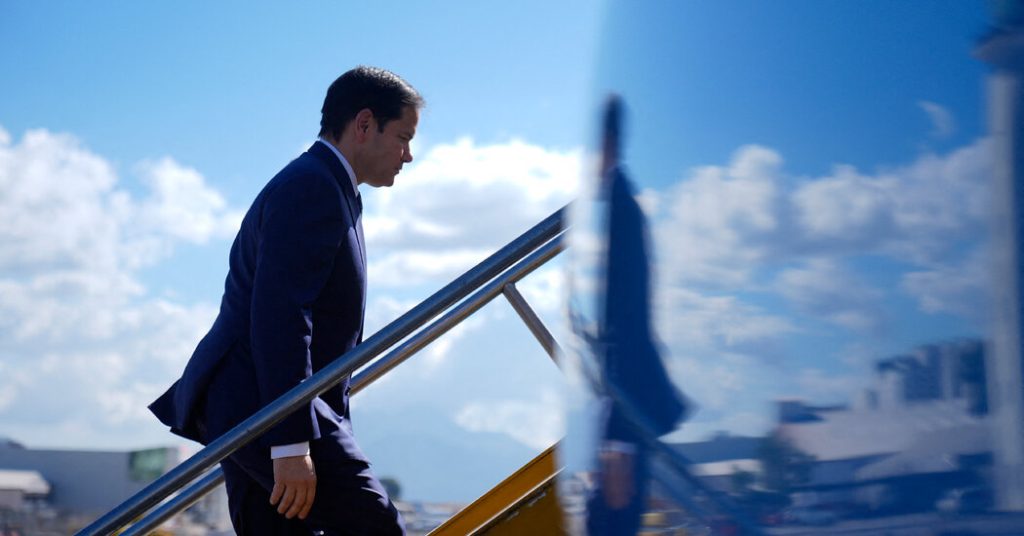Summarize this content to 2000 words in 6 paragraphs Secretary of State Marco Rubio on Wednesday told an official with the United States Agency for International Development that foreign aid was “the least popular thing government spends money on” and had become increasingly difficult to defend, according to a transcript of a private embassy event.Mr. Rubio sought to explain his support for the Trump administration’s systematic dismantling of U.S.A.I.D. during a question-and-answer session he held at the U.S. Embassy in Guatemala City, one day after thousands of agency workers overseas learned that they were being placed on administrative leave and must return home to the United States.No reporters were present at the event, a standard “meet and greet” for secretaries of state visiting foreign capitals, but The New York Times obtained a partial transcript.Some of what Mr. Rubio said reflected public remarks he has made in recent days, but at moments during the embassy event he appeared to speak with some sympathy for the agency.Fielding a question from a polite but concerned Haven Cruz-Hubbard, the U.S.A.I.D. mission director for Guatemala, Mr. Rubio walked a fine line between defending foreign aid, which he called “essential,” and President Trump’s dismantling of the agency.Mr. Rubio also seemed to acknowledge the personal distress gripping much of the diplomatic corps he now manages. “I know it’s hard to ask for patience,” he told Mr. Cruz-Hubbard. “I know it’s hard to ask for trust, because you’ve never met me before. I’ve never been in charge of the State Department. I’ve never been acting U.S.A.I.D. administrator before.”The Trump administration named Mr. Rubio to that position earlier this week. He noted that the agency, which is independent of the State Department, had come under scrutiny before that role “fell upon me.”Mr. Cruz-Hubbard, who said he was a 23-year veteran of the agency, said Mr. Rubio had come at “a sober moment for U.S.A.I.D.” and told him that “we’ve taken a lot of criticism at U.S.A.I.D. for the work that we’ve tried to do, for the sacrifice that we continue to make” to serve U.S. interests.“And, you know, now we are facing the prospect of being sent home,” he said.He listed the agency’s programs in Guatemala and said they contributed to giving Guatemalans incentives to remain in the country rather than migrating north.Mr. Rubio replied that the agency’s programs within the country appeared to be worthy. But he said that this was not true everywhere, and he repeated his recent assertions that U.S.A.I.D. programs must be brought into better alignment with U.S. national security interests.He also indicated that public opposition to foreign aid — which polls have long shown to be based on misinformation, which Trump officials and allies have amplified — had made defending the agency virtually impossible.“I want to tell you that this is not about politics,” Mr. Rubio said. “But foreign aid is the least popular thing government spends money on. And I spent a lot of time in my career defending it and explaining it. But it’s harder and harder to do across the board. It really is.”“But for those of us in charge of doing the work of foreign policy, we understand it is essential,” he added.“The United States is not walking away from foreign aid. It’s not,” Mr. Rubio said. “But it has to be programs that we can defend. It has to be programs that we can explain. It has to be programs that we can justify. Otherwise, we do endanger foreign aid.”Hinting at some regret over the rapid pace with which U.S.A.I.D. workers are being placed on leave and recalled, he suggested that a relatively small number of agency workers had forced the administration into more dramatic action.“We had a problem with some people in the office,” he said. “Does that mean that the actions of 5, 10, 20, 50 people indicted an entire organization? No. But we had people pushing through payments, despite being told not to do so.” The Trump administration has not provided specific examples of such payments.Mr. Rubio said the workers were “almost inviting themselves to be getting in trouble so they can make a news story out of it.”“That is not the way we sought to pursue it. And as a result, it required us to do something else in return,” he added, saying later: “We’re just going to have to do it a little faster than we thought.”A State Department spokeswoman did not immediately respond to a request for comment.
Subscribe to Updates
Get the latest creative news from FooBar about art, design and business.
© 2026 Globe Timeline. All Rights Reserved.







